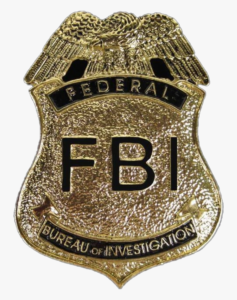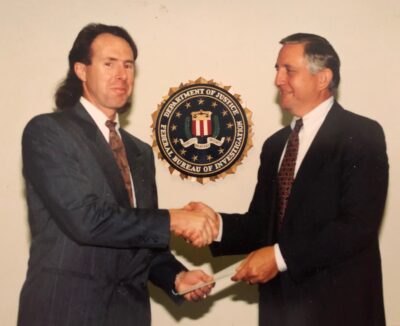FBI 101
Anatomy and Physiology of the FBI
The “Inside” Story
By: John “JJ” Robinson
Preface:

Author John JJ Robinson
There are many misconceptions about the Federal Bureau of Investigation (FBI) and the men and women that serve in this proud organization. As a retired Special Agent, writer and avid reader of novels, I always find it disturbing to read a story or see a film wherein the FBI and the rank and file are represented in an inaccurate or misleading light. I would like to attribute this to a lack of knowledge with regard to the Bureau and the very talented and dedicated people that make up the men and women of the FBI. I will attempt to provide the reader with a description of the Bureau and the people serving in the FBI with the knowledge and understanding of the organization that has been a significant part of my life. Like any organization or family, there are good and bad elements. I have found that the Agents and Support personnel that perform the “real” work in the field are very dedicated and forthright. The strength in the Bureau has always been the people serving in the front lines and trenches in the war on crime.
Division of Labor at the Field Office Level:
The majority of the Bureau labor force is divided between Support Personnel and Special Agents (SAs). The duties of both Support Personnel and SAs varies between the numerous Field Offices, Resident Agencies, Headquarters and Quantico. This paper will address only the Duties of the SAs and Support Personnel in the Field.
The Support Personnel provide critical administrative and clerical support as well as some specialized operational support duties. The SAs in the field conduct the substantive case investigations. In addition, some SAs provide specialized operational duties to support case investigations.
The administrative support personnel in the field are assigned roles in clerical positions, IT support, Electronic Technicians, Automotive Technicians, Evidence Technicians, Language Specialists, Photo Lab Technicians, Intelligence Analysts, Supply Technicians and many other duties. In addition, some Support Personnel are assigned to specialized operational support duties like Surveillance Specialists.
Most of the SAs in the field are assigned to substantive case Squads. These Squads are led by a Supervisory Special Agent (SSA). Each substantive case Squad addresses specific federal violations; e.g., White Collar crimes, Innocent Images (“Crimes Against Children”), Reactive Crimes (fugitives, bank robbery, kidnapping, etc.), Foreign Counterintelligence (FCI)/National Foreign Intelligence Program (NFIP), Drugs, Organized Crime, Gangs, Cyber Crimes, Public Corruption, etc. The SAs assigned to a particular squad specialize in the crimes assigned to that Squad.
In addition to Substantive Case Squads, there are several Operational Support Squads assigned to each Field Office. Among these Squads are Technical Support, Special Operations Group (SOG), Training and Applicants.
The Technical Support Squad provides electronic surveillance systems (audio and/or video) for substantive cases. The SOG provides surveillance support for substantive cases with individual, vehicular and aerial resources. The Training Squad handles SA firearms qualifications, physical fitness and defensive tactics training and police training requirements. The Applicant Squad handles the interviewing and background investigations for SA and Support applicants.
In addition to the primary duties assigned to each SA, there are also collateral duties that can be pursued by each SA. These duties include Firearms Training, SWAT, Defensive Tactics Training, Physical Fitness Training, Evidence Response, Bomb Disposal, Negotiators, Polygraphers, Behavioral Analysis and Legal Instructors.
The Federal Bureau of Investigation Headquarters (FBIHQ) is located in Washington, D.C.. They are responsible for developing the FBI mission and case management.
Organizational Configuration of the FBI:
Each Field Office Squad has a designated FBIHQ Division that is responsible for their specific investigative or operational support assignments. 
Typically, cases are generated in the field due to victim complaints or reported violations of federal laws that occurred within or affect the Field Office’s area of responsibility. However, on occasion, a case assignment may originate at FBIHQ. At which time it is then assigned to a designated Field Office with the respective area of responsibility. Individual Field Offices also transmit “lateral leads” between Offices when investigation requirements are developed beyond their area of responsibility.
The Field Office leadership is assigned to the Special Agent in Charge (pronounced S-A-C). The next level under the SAC is the Assistant Special Agent in Charge (pronounced ASAC). The final level of leadership under the ASAC is the Squad Supervisor. The exceptions to this policy occur in the Los Angeles, New York and Washington, D.C. offices where the overall leadership is performed by an Assistant Director in Charge (ADIC). Then, the SAC, ASACs and Squad Supervisors follow in order of management.
At the current time, there are 56 FBI Field Offices. In addition, many Field Offices have subordinate offices in remote sites or in areas requiring additional assets within the Field office’s geographic area of responsibility. These offices are usually solely investigative in nature and referred to as Resident Agencies (RA). Usually, the RA is manned by several SAs and a few Support Personnel. The leadership of the RA is handled by a Senior Resident Agent.
There is an additional Field element referred to as the Legal Attaché (LEGAT) Program. The LEGATs and Assistant LEGATs are assigned to select foreign Embassies and Consulates throughout the world. The number of these LEGAT deployments is occasionally changed to reflect foreign policy. The LEGATs provide liaison functions between FBIHQ and indigenous law enforcement and legal offices.
https://www.justice.gov/doj/organization-mission-and-functions-manual-federal-bureau-investigation
Current Employee Recruitment Procedures:
 Current FBI policy requires all applicants for Special Agent and Support positions to apply through the FBI Jobs Website. Applicants must be US citizens with no criminal record and successfully pass a drug screening test.
Current FBI policy requires all applicants for Special Agent and Support positions to apply through the FBI Jobs Website. Applicants must be US citizens with no criminal record and successfully pass a drug screening test.
After reviewing the prospective employees’ applications, FBIHQ contacts the applicants and schedules an interview and any testing. If the applicant successfully passes these initial phases, a polygraph test is scheduled. Most of these phases are conducted at the Field Office closest to the applicant.
The final phase of the application process is the initiation of a background investigation. Successfully accomplishing all these phases for Special Agent applicants results in an offer of employment and the individual being placed on a list to attend the Special Agent Academy in Quantico, VA. For Support applicants, the successful completion of the application process results in an offer of employment. Most Support employees are initially assigned to the Field Office from which they were living during their application process. Some specialty Support positions are recruited for location and/or job assignment specific in an area other than near their residence.
The Career Path of a Special Agent

The career paths of Special Agents (SAs) are as varied and unique as the individuals themselves. No two (2) are alike. Some SAs pursue the management path. While other SAs choose to remain working in the field for the majority of their career. I will attempt to provide an example of a typical career field SA, extracted from my own 28 years of service in the field.
Before the advent of the Internet, most of the recruiting for Support and Special Agent personnel was conducted through the individual Field Offices or FBIHQ. I was recruited by the Los Angeles Division Field Office in 1982, while I was attending Law School.
The Bureau recruited SA applicants based on certain categories of qualification. At that time the categories were law, science, accounting, and general BA/BS degrees. I submitted my SA application to the Los Angeles (LA) Field Office upon receiving my JD degree.

Photo circa 1988 pre-retirement. John “JJ” Robinson receiving a foreign counterintelligence award for an undercover project, hence the long hair.
I passed the CA Bar in 1982 and received several offers of employment as an attorney. However, I also received a call from the LA Field Office offering me an entry level position as an SA. I immediately accepted the offer and was assigned to a slot in the FBI New Agents’ Class of 83-4 which started training at the FBI Academy in Quantico, VA on 2/22/1983.
The policy at the time required that New Agent graduates from the FBI Academy return to the Field Office/Division from which they were recruited to serve six (6) months. This was a requirement because new Civil Service employees were not eligible for a “no cost” transfer until they had been employed for at least six (6) months. After completing the six (6) months, New Agents were then assigned to a medium to small sized Field Office for 18 months to complete their training and probationary period.
While in the LA Field Office I served on the White Collar Squad and then on the Reactive Squad (Fugitives, Bank Robberies, Kidnapping, Theft From Interstate Shipments, etc.) in the Long Beach Resident Agency. I was then assigned to the New Orleans Field Office Reactive Squad in January 1984. I served in New Orleans until my second mandatory transfer in March 1985.
This next phase of a New Agent’s career required a transfer to a “Top 12 Field Office”. A “Top 12 Field Office” was one of the 12 largest Field Offices of the then 52 Divisions. New Agents were given the opportunity to request up to three (3) Field Offices from the “Top 12” list. I chose San Francisco because it was close to my family in Southern California. I was also assigned to the Presidio of San Francisco from 1972 to 1974 with the 115th Military Intelligence Group and my wife and I liked the Bay Area.
Upon arriving at their “Top 12” Field Office, SAs typically start to develop their individual career paths. The first step is to determine the substantive case area that they would like to work in. Depending on the size of the Field Office and the investigative priorities, the substantive case squads can vary within each Field Office. The San Francisco Field Office had a significant number of resources dedicated to the Foreign Counterintelligence (FCI) Program. (NOTE: this program has been renamed as the National Foreign Intelligence Program.) Due to my previous Military Intelligence experience, I was assigned to the Soviet FCI Squad.
During this time, I worked on several FCI cases including the Edward Lee Howard espionage case, Aldrich Ames espionage case, Robert Hanssen espionage case, John Walker Jr. espionage case and the Richard W. Miller espionage case. I also participated in one of the many collateral duties that are available to SAs in the field. I served as a Sniper and Sniper Team Leader from 1985 to 2001.
Shortly after being assigned to the San Francisco Field Office, I started to develop an interest in one of the many Operational Support specialties for SAs assigned to the Field, i.e., electronic surveillance. I became trained and certified as a Technically Trained Agent (TTA) and was assigned to a newly created Technical Support Squad in San Francisco. I served as a TTA from 1990 until my retirement in 2011.
In furtherance of my duties as a SWAT member and TTA, I have been deployed to Iraq (twice), England (twice), Kenya, Bosnia and many locations throughout the US.
The majority of individuals that become FBI SAs usually serve the Bureau until they are eligible for retirement or are forced into retirement as a result of the mandatory retirement age set for federal law enforcement and firefighters by the Civil Service Commission.
Post Script: John “JJ” Robinson, Special Agent, Federal Bureau of Investigation (Retired) is a veteran of the US Army with seven years of service in the Military Intelligence Branch. He is a retired FBI Special Agent with 28 years of domestic and foreign field deployments. He is currently an “Inactive” member of the California State Bar Association and a licensed Private Investigator in the State of Nevada. He is the proprietor of O’Hana Security Consultants, a Nevada LLC that has five (5) retired FBI SA Security Specialists that provide security consulting with specialization in performing Technical Surveillance Countermeasures (TSCM) services for corporate and private clients throughout the US and numerous foreign countries.











John, thank you for being my guest today and for the help you’ve given to us writers. Could you give us an example (not naming the author of course) of a scenario that made you shake your head? Again, thanks!
Donnell,
I think that one of the scenarios that I take umbrage at is when a writer has an FBI Supervisor or ASAC taking part in an actual investigation in the field. I think this happens more in TV and movie presentations. I realize that there are moments where a writer might want to utilize a character that has a perceived higher significance or import than a regular Field Agent in a particular scene. And sometimes we have to use the “literary license” trump card in spite of reality. But in actuality, important cases are usually assigned to the most experienced Field Agent on the substantive squad. This seasoned Field Agent usually is significantly more experienced than the Supervisor. Whereas, a Supervisor or ASAC rarely goes into the field unless a high profile arrest is involved.
I know this is a small matter, but it does make me “shake my head” when I see or read a scenario depicted in this manner.
Hope this helps to answer your question.
JJ
Thanks, John. Yes, I get it. I have a dear friend who has a successful series that does that. She is a graduate of the FBI Academy so she knows good and well the hierarchy involved. But her goal is to entertain and sell books. She’s a great person and has done well. I on the other hand, cannot suspend my belief when an FBI agent takes off with the heroine/protagonist and solves the case all on his own. There’s a lot of cooperation involved in taking down criminals. Thanks for expanding on your position.
very interesting and helpful. thank you.
You’re very welcome Vicki. Thank you for you positive feedback.
J
Thank you for such an in-depth explanation, John.
Thank you for your response. You’re very welcome.
J
John, thanks so much for this detailed post that I will save and refer to while I’m writing my next book. I very much appreciate the information. And thank you, Donnell, for hosting!
My pleasure, Margaret. John is a terrific resource and lecturer!
Margaret,
Arigato.
Please feel free to reach out to me anytime you have a question that falls within my skillsets.
And let me know when you have any new releases. I’d love to expand my reading list.
Best,
J
Thank you, John! I appreciate your offer, and I’m sure I’ll be getting in touch. The book I’m writing now will definitely need an FBI agent in it.
And my next book comes out March 7. It’s called Standing Dead, and it’s the eighth book in my Timber Creek K-9 Mystery series. It can stand alone if you don’t want to start with book one. Thank you for asking!
Take care,
Margaret
Thank you to everyone who took the time and effort to read the material that Donnell was kind enough to post on her blog. I’m new to the world of writing, but I have always been an avid reader of novels that were packed with the material that I have been gifted to experience in my life.
Please feel free to reach out to me as a reference source if you have any questions or issues that you feel I may be able to provide relevant solutions or alternative views. The information is gratis. I realize that sometimes factual data may conflict with your storyline. And when conflicted, we all have to make that choice as to pursue the factual route or the storyline. Admittedly, the storyline is usually the best in light of the entertainment value. Novels are intended to entertain and not usually a source for factual data.
I wanted to give a big “thank you” to Donnell for introducing me into the captivating and limitless world of writing novels. I hope to be able to learn from, as well as assist, all you talented writers.
Thank you all again viewing the material and I apologize for the “mug” photo. It was the only selfie I could find. It was used for my Nevada PI License and it needed to be emotionless. Which I think I was successful in accomplishing! LOL
Best to all,
JJ
John-
Thanks for that detailed summary of the hierarchy of the FBI. I have a minor character in a series who is a Special Agent in Indian territory. I always tread carefully when writing him because I’m unsure if I’m getting it right. It’s reassuring to have a contact to question.
Connie Gillam
Connie,
I’d be more than willing to help you with any answers to your questions or furnishing law enforcement related background material. The FBI’s program for “Crime on a Government Reservation”, which encompasses the Native American Reservations, has many complex issues and unique problems.
BTW, two (2) of my most favorite authors (excluding Donnell due to personal biases) are Tony Hillerman and his daughter Anne. I love their writing style, storylines and characters. Truly awesome work.
J
Ha Ha, John. I appreciate the shout out. Anne Hillerman is a lovely woman and a member of my Albuquerque chapter 🙂
Many thanks to both Donnell and John for this excellent piece. As both a federal-practice trial lawyer and graduate of the Houston Field Office Citizens’ Academy, I shake my head at writers who would rather “shortcut” to the action rather than reflect the complex network of characters and skills that make FBI investigations as astonishing as they are.
Ann,
Spot on! Sometimes being myopic to reality when writing a novel may appear to be the easier solution to an occasionally complex storyline issue. Whereas, a little homework can really prove to create a more credible answer in the long run.
Thanks Ann and congratulations on being a member of an elite alumni; the FBI’s Citizen’s Academy.
J